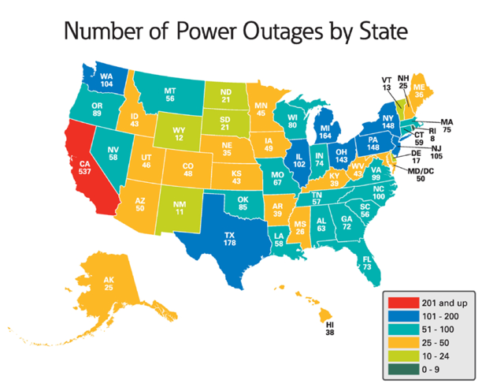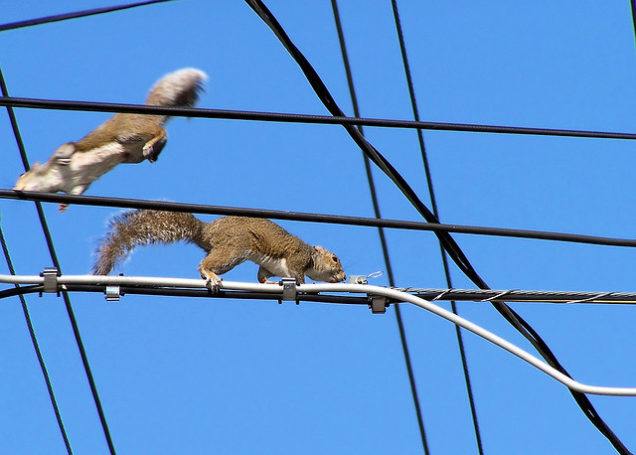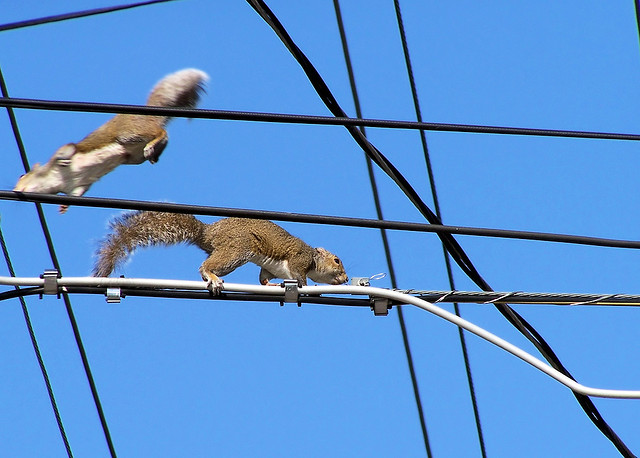His target is non-discriminatory. No neighborhood is safe. He is no terrorist and may not be on the America’s Most Wanted list, but in a way maybe he should be.
He’s cute, cuddly and fun-loving and known more for his bushy tail than most other things. Yet the squirrel is a creature that has for a number of years now been among the top causes for power outages in the United States.
Depending on the area, squirrels and other small animals cause as many or more power outages as ice storms, heat waves, system failures and tree limbs on an annual basis.
The issue has been reported on by most major news conglomerates, including USA Today and The Washington Post. Headlines are tongue in cheek, but the news is real and the lesson is invaluable.
Power outages, also known as electrical blackouts, happen. They don’t discriminate and are almost impossible to predict. And while stories about squirrels going rogue and attacking the nation’s power grid are entertaining, chances are the folks affected by those power failures aren’t as amused.
What causes random power outages? Per The Washington Post, squirrels cause about 10-20 percent of all power outages. Additional causes include:
- Electrical failures caused by age and weather patterns, as equipment is affected more over time. Higher demands on the power lines also but additional stress on older systems.
- Neighborhoods that are dense with mature trees are often more likely to experience power outages on a regular basis. Many municipalities schedule maintenance every few years to keep tree limbs from interfering with power lines, but that doesn’t protect against severe weather or aging equipment.
- Aside from the impact on nearby greenery, the weather itself can wreak havoc on a power grid. High winds, lightning strikes, ice storms and extreme heat can all cause interruptions in power.
- Accidents also happen from time to time, where (for example) a larger vehicle or construction crew may mistakenly strike a pole resulting in an outage.
- Circuit interruptions also happen occasionally. Albeit brief, these are usually marked by that oven clock flashing when you get home from work.
 Power outages are on the rise nationwide. A 2015 report by Energy Manager Today reported that $14.2 million people were affected by power outages in 2014.
Power outages are on the rise nationwide. A 2015 report by Energy Manager Today reported that $14.2 million people were affected by power outages in 2014.
We can’t control the rate at which trees grow or when mother nature decides to produce an epic flood that results in neighborhood panic. No one knows when lighting will strike, a construction worker will make one false move or when a squirrel will decide to make a cozy home for itself atop an electrical pole. Yet there are many ways to protect yourself from all of life’s unknowns, including power outages.
Always Have a Power Loss Protection Plan
- Keep necessities on hand. It’s always a good idea to keep a pantry of some basic canned goods and water in your home in case of emergencies (like an electrical outage). A gallon of water per person each day is recommended. In addition, it helps to have some ice ready to go in your freezer and one or two coolers to use in case you need to preserve food.
- Be smart about your phones. We live in a time where people don’t use land lines as much. Instead, we rely more on our phones and other technology to get in touch with others. In the case of an unforeseen power outage, having tools like an external battery charger on standby can be incredibly helpful.
- Have a plan. The plan will vary from family to family, but the most essential component is having an emergency kit of some kind easily accessible. The kit should be stored in a place that is easy to find without too much assistance from light, and everyone in the home should know where it is.
- Contact information for electric company
- Flashlights or lanterns (and extra batteries)
- Battery or crank-powered radio
- First-aid kit (band-aids, gauze, tape, scissors, pain medicine, prescription medicine, hydrocortisone, hydrogen peroxide)
- Family medical and emergency information
- Cleaning and sanitation supplies
- Cash money (in case ATMs are down as well)
- Candles, glow sticks and matches or lighter
- Paper products (paper plates, plastic silverware, etc.)
- Camping stove (with propane tank or charcoal)
- Something fun (board games or cards to keep the family’s mind off things)
Alternate power sources like a home solar power generator can help you stay powered during blackouts
Have an alternate power source. It may just be among the best investments you make in your home to have a generator capable of powering electronics in case of a power outage.
A solar powered generator can be portable, yet is capable of powering the entire home. Solar powered generators resonate especially well with homeowners with high-tech medical equipment to power. They consist of solar panels, an inverter and a deep cycle battery, which work together to produce energy when power is lost. When the power goes out, the generator works to power the electrical circuits its connected to, providing electricity to your home in a reliable and energy efficient way.




